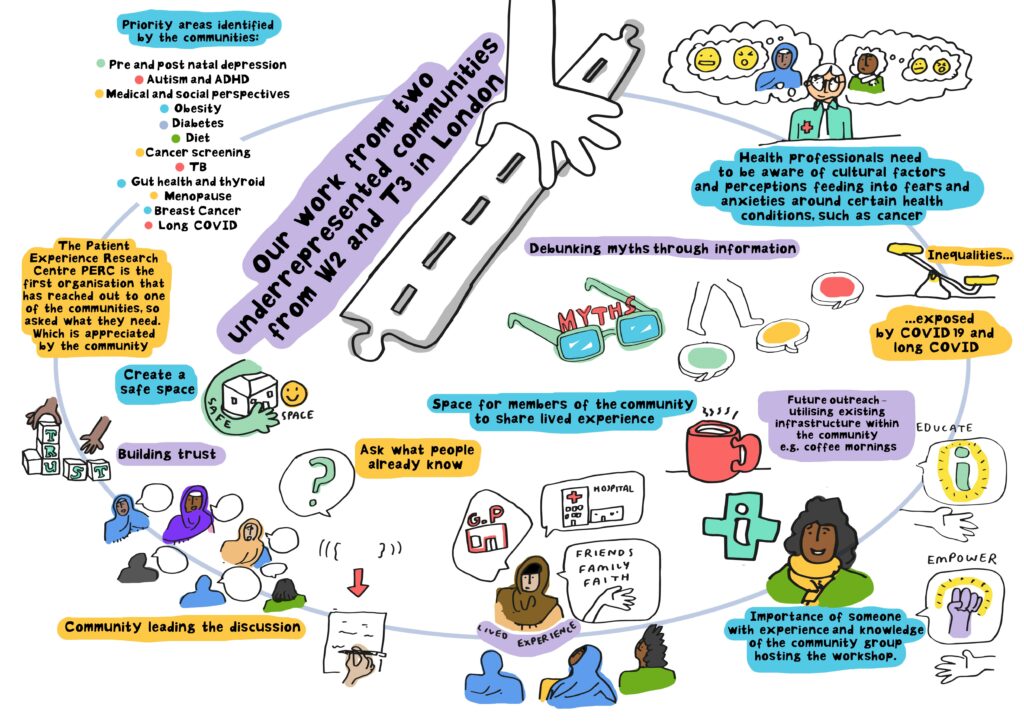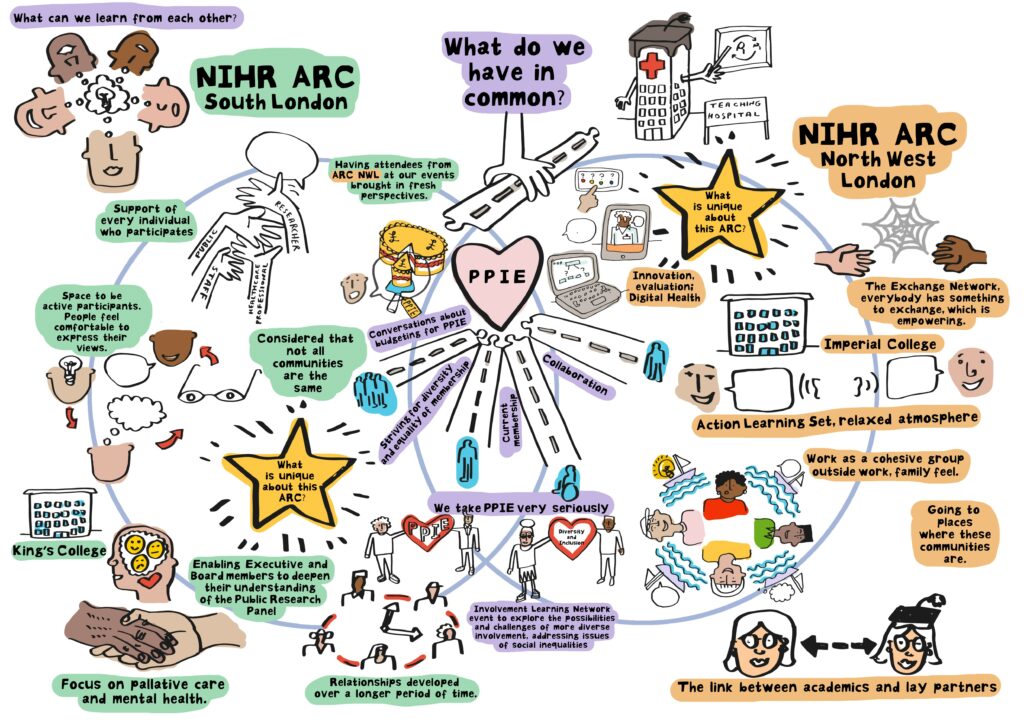Topic:
Resource type:
Authors:
Publication date:
Date added to Learning for Involvement:
What could a sustainable hybrid model of community involvement in health research look like? The Applied Research Collaboration Northwest London and Applied Research Collaboration South London have co-designed friendly online and physical ‘community spaces’ as the first step towards this goal.
What’s the issue?
Patient and public involvement in research (PPI) has accelerated over the years and has been recognised as an important and essential component of relevant and valuable studies in health and social care research globally (Boivin et al. 2018). Although much progress has been made in the area, not enough has been done around placing the issues of equality, diversity, and inclusion (EDI) (Ocloo et al. 2021) or accessibility (Chapko et al. 2020) at the heart of PPI. Most PPI models in health research are centred around ‘static’ PPI panels with public contributors who are ‘60+, white, well- educated and with adequate finances for (initial) out- of- pocket costs’ (Clark et al. 2021) providing little room for creativity, challenging accessibility, and widening research participation and involvement for all.
Also, PPI as a term coined by academic and healthcare institutions, does not reflect the necessity for involving communities as part of the research co-production endeavour (the current NIHR guidelines) which may constitute a separate and/or complementary model of involvement. It is vital to collectively come up with PPI online and physical co-production spaces with EDI principles and accessibility embedded throughout for the mutual benefit of communities and researchers.
What did you do?
The aim of the project was three-fold:
Aim#1
To embed a ‘reflective exercise’ into the already existing PPI infrastructure in all partners highlighting areas of achievement and improvement. Six members of the Applied Research Collaboration Northwest London (ARC NWL)Public Partners Advisory Group and staff were guests at the Applied Research Collaboration South London’s (ARC SL) Public Research Panel, Involvement Learning Network and online Inside Research symposium on inequalities in healthcare. In turn, several public members and staff from ARC SL attended the Exchange Network event and the Collaborative Learning Event.
Aim#2
A priority identified by ARC NWL, was to continue a conversation with the communities across NWL on their current needs, priorities, and preferred ways of working together. This included co-designing friendly online and/or physical ‘community spaces’ as the first step towards a sustainable hybrid model of community involvement in health research. Two communities partnered with us on this project: Mosaic Community Trust (Mosaic) and members of the Somali community living in and working for the communities in Hounslow.
Aim#3
To tie in with encouragement of cross-London cooperation, to reflect together on learning from activities arising from Aims #1 and #2 and explore possible areas for future cross-London collaboration in a creative artist-led session.
What happened?
Aim#1
The ARC-SL event enabled Executive and Board members to appreciate the Public Research Panel. Attendees of the Involvement Learning Network explored the possibilities/challenges of diverse involvement alongside social inequalities. The ARC-NWL Exchange Network enabled public contributors discussing racism in research.
The ARC-NWL found the ARC-SL events educational with an opportunity to meet medical staff/patients. While appreciating learning about health inequalities, the public partners preferred actioning the proposed solutions.
Aim#2
With Mosaic, we co-developed health awareness sessions linked to their priorities (breast cancer and long Covid) delivered by healthcare professionals at a local venue attended by women of diverse backgrounds. A short-term impact was the ability to dispel myths in a safe space.
With the Hounslow Somali community, we held six online conversations to identify their priorities (postnatal depression and autism/ADHD). We co-designed a culturally appropriate session in a Hounslow Mosque, led by Somali healthcare professionals (Infographic#1).
Aim#3
In an artist-led ‘reflective exercise’, we reflected on our ARC NWL/SL exchanges (Infographic#2).
What could other people take from this?
Aim#2: conversation with the communities across NWL (Infographic#1)
The communities that we worked with had a strong preference for planning and organising in-person events therefore our idea for developing a PPIE online ‘community space’ was dropped. The summary of key issues and recommendations for future collaboration as identified by the two communities is presented in Infographic#1. Here, we highlight the key recommendations for creating inclusive PPI spaces:
- Build Trust;
- Ensure that someone with experience and knowledge of the community group hosts the workshop;
- Create a safe space for members of the community to share their lived experiences;
- Ensure the Community leads the discussion;
- Ask what people already know;
- Debunk myths through information;
- Be aware of inequalities exposed by Covid-19 and Long Covid;
- Health professionals need to be aware of cultural factors and perceptions feeding into fears and anxieties around certain health conditions;
- The Patient Experience Research Centre (PERC) was the first orgnaisation that has reached out to one of te communities,. They asked what the community needed, which was appreciated by the community
- Future outreach – utilise existing infrastructure within the community.

Aim#3: the next steps for ARC NWL & ARC SL (Infographic#2)
Together, we creatively explored the following:
- What is unique about each ARC?
- What do we all have in common?
- What can we learn from one another?
Infographic#2 depicts the synthesis of our responses to these three questions. Here, we highlight the key messages (including issues and challenges) common to both ARC NWL and ARC SL (the inner circle in the Venn Diagram) – these could be potentially transferable to the remaining ARCs and other NIHR infrastructures:
- We take PPIE very seriously;
- Appropriate, fair and efficient budgeting (given that this is among the perennial challenges for PPIE overall);
- Striving for diversity and equality of memberships. At the Involvement Learning Network event organised by the ARC SL, the possibilities and challenges of more diverse involvement, addressing issues of social inequalities were explored;
- Reflecting on current membership and ARC SL/NWL collaborations with other partners across London and beyond (e.g. links with community-based organisations);
- Overall, prioritising action over passive receipt of information around health inequalities.

Are there any resources/outputs?
Links to the activities and resources alongside any reflections and outputs mentioned throughout this report:
Activities led by the ARC SL
ARC South London has continued to build on learning, including from a review of the Public Research Panel; sharing reflections from public and community members on Executive and Board (with a wider light-touch review of involvement at ARC-wide level underway); further events held which have brought together public contributors and communities with researchers.
Activities led by the ARC NWL
- ARC NWL Exchange Network: Patient, Public, Community Engagement and Involvement (nihr.ac.uk)
- Collaborative Learning Events: Events (nihr.ac.uk)
What’s next?
- The lessons learned and the initial reflections are guiding our current co-design of the new Theme’s objectives amid the 18M extension to the current ARC NWL programme (Theme: Patients, Public, and Communities Engagement and Involvement in Research).
- Led by Patient Experience Research Centre:
- A subsequent health information session was co-designed with the Somali community on diet and nutrition at which the community members attending provided their research priorities for components of the Somali traditional diet. Another two health information sessions are being planned on TB and post-natal depression.
- Leaders from both the Somali community and Mosaic with whom we have been working with have taken on a Community Partner role in the Imperial Biomedical Research Centre (BRC)’s public involvement in governance framework and will be part of a group of community members advising PERC on community outreach and engagement around PIEP with the view to this informing all 14 BRC research Themes.
- Further health information sessions, based on the unmet need, have been co-designed and delivered with the Mosaic on stroke, blood pressure and menopause. These sessions have provided the Community with accessible information about these topics and dispelled myths previously held about these conditions.
-
- Led by ARC SL – ARC SL has:
- consolidated and extended relationships, including research staff, current contributors and community partners jointly exploring possibilities to secure resources to strengthen diverse involvement, particularly through participatory research;
- sought to improve coordination across the ARC, Health Innovation Network (currently leading on a mapping project) and Clinical Research Network South London in relating to community organisations, while recognising the varied ways in which local patients, carers and residents might wish to connect with research;
- Led by ARC SL – ARC SL has:
- See also “Activities led by the ARC SL” described above.
- Led by the Clinical Research Network North West London:
-
- Recently appointed a new PPIE Manager therefore with more capacity for community engagement work moving forward.
Authors
Dorota Chapko on behalf of:
Regions and Academic Partners:
- ARC NWL as the Imperial Lead partnering with NIHR Imperial Biomedical Research Centre (BRC) Patient Experience Research Centre (PERC) alongside other partners:
- NIHR Clinical Research Network (CRN) NWL
- Imperial Clinical Trials Unit (ICTU)
- Imperial Clinical Research Facility (CRF)
- NIHR London IVD Cooperative
- Imperial College Healthcare NHS Trust
- ARC South London
Community partners in ARC NWL:
- The Mosaic Community Trust
- Members of the Somali community in Hounslow
–